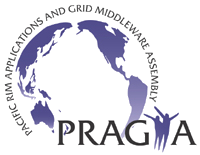Travel
PRAGMA 38 is CANCELLED due to the recent coronavirus outbreak. Details for the Fall workshop (PRAGMA 39) will be announced later.
Hong Kong has one international airport (Hong Kong International Airport). For most worldwide destinations there would be direct flight.
Please see the Venue/Lodging page for more details.
Hong Kong Dollar (HKD) is the legal tender in the city. Coins are issued by the government in 10 cents, 20 cents, 50 cents, 1 dollar, 2 dollars, 5 dollars and 10 dollars, where a dollar is divided into 100 cents. Banknotes are issued by the HSBC, the Standard Chartered Bank and the Bank of China, with nominations of HKD10, HKD20, HKD50, HKD100, HKD500 and HKD1000. For details one could refer to the Hong Kong Monetary Authority or the Wikipedia (for coins and banknotes).
The Hong Kong dollar has pegged at HKD7.8 per US dollar since the 1980s. Exchange rates to other currencies follow. There are no shortage of money exchange in the city, but they may charge commission, or having wider exchange rate margins for banknotes. Many hotels also provide money exchange service for their customers.
The electrical supply in Hong Kong comes in 220 volts AC at 50Hz. Transformer maybe needed if you come from regions which uses 100-volts/110-volts supply. The UK three-pronged plug (Plug Type G) is used in Hong Kong. Plug converter can be bought in local shops inexpensively, or borrowed from the hotel.
Hong Kong is one of the telecommunication hubs in Asia and thus mobile service is heavily competitive. All of 2G (GSM), 3G (UMTS) and 4G (LTE) services are available in Hong Kong. 5G spectrum had been auctioned and services will roll out during 2020. You may check if your operator has roaming service in Hong Kong, or purchase tourist SIMs from various operators and use them for your stay.
Most restaurants levy a 10% service charge on top of the bill, but loose change will always be welcomed by the waiters. Offering tips to bellboys, porters, restroom attendees and taxi drivers is up to your own discretion.
Hong Kong is geographically compact and boasts one of the world’s most efficient, safe, affordable and frequent public transport systems. Whether by taxi, ferry, rail, bus or tram, you can get around easily and catch wonderful glimpses of the city along the way. For more inforamtion, please refer to Hong Kong Public Transport System.
-
Taxi
Only the RED-coloured taxi will bring you to the Hong Kong Island. It will cost about HKD350 and 35 minutes. Please get ready for cash as electronic payments are rarely seen. -
Airport Express + MTR
The Airport Express train at the arrival terminal will bring you to the Hong Kong Station, then you could walk on to the Central Station, where the Island Line (Blue) can bring you to the HKU station. It will cost about HKD115. Furthermore, round-trip ticket between Hong Kong and Airport Station could be bought at the station or online. You may also buy the local transport IC card called Octopus at the Customer Centre. -
Airport Bus
Route A10 is available and one can get off the bus at the “Shek Tong Tsui Complex”. Exact fare in cash or paid with Octopus card.
The temperature in Hong Kong during March ranges from 62 - 71 degrees Farenheit, 17 - 22 degrees Celsius. Local weather forecast are provided by the Hong Kong Observatory, which is the equivalent of the meteorological office in Hong Kong.
In emergency, you could call the “999” hotline for help from the Police and Fire Services (which also include ambulance). Inside the town, in most circumstances the fire services will arrive within 6 minutes. The ambulances, or first reponders, will arrive in 12 minutes. External defibrillators are also kept by many shopping malls, MTR stations, government venues (including on HKU campus, see Safety Office AED map).

